Victims of Yalta: Stalin, Churchill & FDR Were Guilty Of The Mass Murder Of Millions Of Allied POWs
AMINTIRI DESPRE VIITOR-ROMÂNIA DE MÂINE , RrOMANIKA BABANA :: ISTORIA -prima si cea dintii carte a unei natii :: PROPAGANDA E MAI EFICIENTA DECIT DIVIZIILE DE BLINDATE(Vladimir Putin ) :: Undeva in Est , nebunia ca normalitate
Pagina 1 din 1
 Victims of Yalta: Stalin, Churchill & FDR Were Guilty Of The Mass Murder Of Millions Of Allied POWs
Victims of Yalta: Stalin, Churchill & FDR Were Guilty Of The Mass Murder Of Millions Of Allied POWs
/*/
By John Wear
…over 3 million Russians stranded in Allied-controlled territory at the end of World War II… for most Soviet POWs, being shot… was far preferable to being tortured and executed on their return to the Soviet Union… So strong was the [prior] European tradition of granting political asylum that no nation before 1939 appears even to have contemplated compelling the return home of citizens whose lives or liberty might be endangered.
A Wears War Review Of ‘Victims Of Yalta’ By Nikolai Tolstoy.
Victims of Yalta by Nikolai Tolstoy tells the story of over 3 million Russians stranded in Allied-controlled territory at the end of World War II. Some of these Russians were prisoners of war (POWs), while others were anti-Communist fighters who had fought on the side of Germany. In a secret agreement later confirmed by Winston Churchill, Franklin Roosevelt and Joseph Stalin at Yalta, these Russian soldiers were condemned to be sent back without choice to the Soviet Union. Knowing that torture and death lay ahead of them, many of these Russians chose to end their own lives before returning to the Soviet Union.

Soviet prisoners at German camps who were to be repatriated to the Soviet Union after the war often begged to be shot on the spot rather than be delivered into the hands of the Soviet NKVD. A shock force of 500 American and Polish guards was required at Dachau to forcibly repatriate the first group of Soviet prisoners to the Soviet Union. What followed is described in a report submitted to U.S. diplomat Robert Murphy:
Conforming to agreements with the Soviets, an attempt was made to entrain 399 former Russian soldiers who had been captured in German uniform, from the assembly center at Dachau on Saturday, January 19 [1946].All of these men refused to entrain. They begged to be shot. They resisted entrainment by taking off their clothing and refusing to leave their quarters. It was necessary to use tear-gas and some force to drive them out. Tear-gas forced them out of the building into the snow where those who had cut and stabbed themselves fell exhausted and bleeding in the snow. Nine men hanged themselves and one had stabbed himself to death and one other who had stabbed himself subsequently died; while 20 others are still in the hospital from self-inflicted wounds. The entrainment was finally effected of 368 men who were set off accompanied by a Russian liaison officer on a train carrying American guards. Six men escaped en route.[1]The report ended: “The incident was shocking. There is considerable dissatisfaction on the part of the American officers and men that they are being required by the American Government to repatriate these Russians…”[2]
Thus, for most Soviet POWs, being shot in a German concentration camp was far preferable to being tortured and executed on their return to the Soviet Union.
Tolstoy in Victims of Yalta produces strong arguments that the repatriation of Soviet POWs was not necessary. Tolstoy writes,
So strong was the European tradition of granting political asylum that no nation before 1939 appears even to have contemplated compelling the return home of citizens whose lives or liberty might be endangered.”[3]
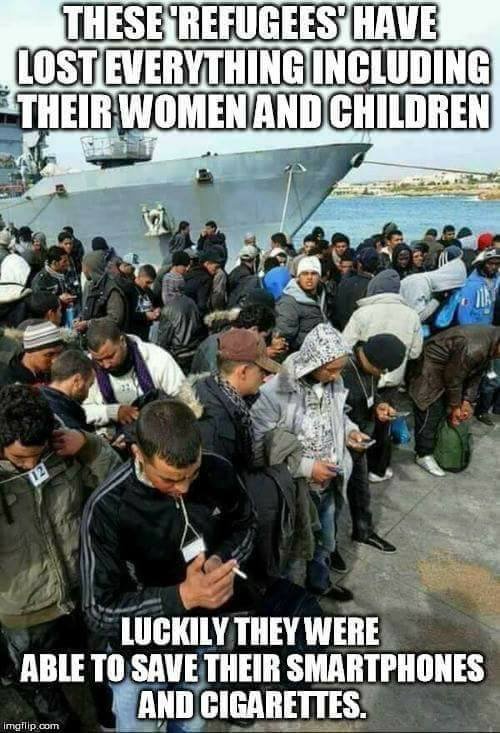 The strong European tradition of offering asylum appears to have been revived. As long as they’re not native to Europe.
The strong European tradition of offering asylum appears to have been revived. As long as they’re not native to Europe.Tragically, however, British and American leaders forced repatriation of Soviet POWs in order to maintain good relations with Stalin and the Soviet Union. The repatriation of the Soviet POWs can be seen as a policy of appeasement that at the time was thought to be in the best interests of the United States and Great Britain.
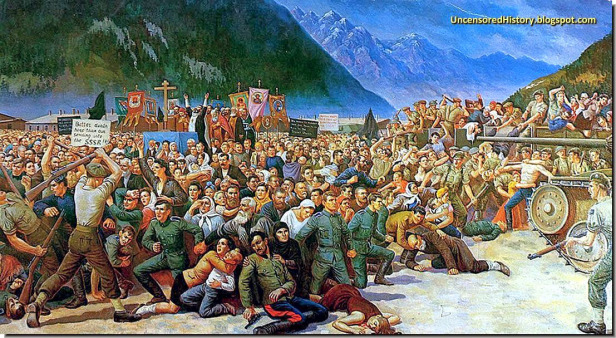 “Betrayal of the Cossacks at Lienz” by S.G. Korolkoff. Korolkoff was a survivor of the forced repatriations and the people depicted in the painting were all real people who were there. Korolkoff recreated the faces from photographs. Source link. It mattered little whether Russian POWs fought for or against the Allies. Their fate was often the same. An astute person might wonder why the Holodomors prior to WWII are also conveniently downplayed. These orchestrated horrors point strongly to the dangerous climate of Europe in that era. Germany’s efforts to halt the onward march of Bolshevik Communism across Europe becomes far more reasonable when considered in its correct historical context. The scale of the Bolshevik slaughter of millions of civilians was a terrifying threat encroaching on eastern, then central Europe. Why did Churchill and FDR permit and hasten it? They were both fully aware as documented here and Churchill had even previously witnessed the hell of a scorched earth Holocaust policy by his nation. Read here.
“Betrayal of the Cossacks at Lienz” by S.G. Korolkoff. Korolkoff was a survivor of the forced repatriations and the people depicted in the painting were all real people who were there. Korolkoff recreated the faces from photographs. Source link. It mattered little whether Russian POWs fought for or against the Allies. Their fate was often the same. An astute person might wonder why the Holodomors prior to WWII are also conveniently downplayed. These orchestrated horrors point strongly to the dangerous climate of Europe in that era. Germany’s efforts to halt the onward march of Bolshevik Communism across Europe becomes far more reasonable when considered in its correct historical context. The scale of the Bolshevik slaughter of millions of civilians was a terrifying threat encroaching on eastern, then central Europe. Why did Churchill and FDR permit and hasten it? They were both fully aware as documented here and Churchill had even previously witnessed the hell of a scorched earth Holocaust policy by his nation. Read here.Victims of Yalta also states that Stalin abandoned all Soviet POWs during the war. The Soviet Union was not a party to The Hague Conventions. Nor was the Soviet Union a signatory of the Geneva Convention of 1929, which defined more precisely the conditions to be accorded POWs. Germany nevertheless approached the International Committee of the Red Cross (ICRC) immediately after war broke out with the Soviet Union to attempt to regulate the conditions of prisoners on both sides. The ICRC contacted Soviet ambassadors in London and Sweden, but the Soviet leaders in Moscow refused to cooperate. Germany also sent lists of their Russian prisoners to the Soviet government until September 1941. The German government eventually stopped sending these lists in response to the Soviet Union’s refusal to reciprocate.[4]
Over the winter Germany made further efforts to establish relations with the Soviets in an attempt to introduce the provisions of The Hague and Geneva Conventions concerning POWs. Germany was rebuffed again. Hitler himself made an appeal to Stalin for prisoners’ postal services and urged Red Cross inspection of the camps. Stalin responded:
There are no Russian prisoners of war. The Russian soldier fights on till death. If he chooses to become a prisoner, he is automatically excluded from the Russian community. We are not interested in a postal service only for Germans.”[5]
In February 1942, the ICRC told Molotov that Great Britain had given permission for the Soviet Union to buy food for captured Soviet prisoners in her African colonies. Also, the Canadian Red Cross was offering a gift of 500 vials of vitamins, and Germany had agreed to collective consignments of food for POWs. The Red Cross reported: “All these offers and communications from the ICRC to the Soviet authorities remained unanswered, either directly or indirectly.” All other appeals by the ICRC and parallel negotiations undertaken by neutral or friendly nations met with no better response.[6]
The death of millions of Russian POWs in German captivity constitutes one of the major tragedies of the Second World War. However, much of the blame for the terrible fate of these Soviet soldiers was due to the inflexibly cruel policies of Joseph Stalin. A major portion of the Soviet POWs who died from hunger could have been saved had Stalin not called them traitors and denied them the right to live. By preventing the ICRC from distributing food to the Soviet POWs in German captivity, Stalin needlessly caused the death of a large percentage of these Soviet POWs.
A Red Army sergeant who was captured by the Germans when his unconscious body was dug out from the ruins of Odessa later joined General Andrei Vlasov’s Russian Liberation Army. The sergeant bitterly complained of the Soviet Union’s betrayal of its POWs:
Tell me, why did the Soviet Government forsake us? Why did it forsake millions of prisoners? We saw prisoners of all nationalities, and they were taken care of. Through the Red Cross they received parcels and letters from home; only the Russians received nothing. In Kassel I saw American Negro prisoners, and they shared their cakes and chocolates with us. Then why didn’t the Soviet Government, which we considered our own, send us at least some plain hard tack?….Hadn’t we fought? Hadn’t we defended the Government? Hadn’t we fought for our country? If Stalin refused to have anything to do with us, we didn’t want to have anything to do with Stalin![7]
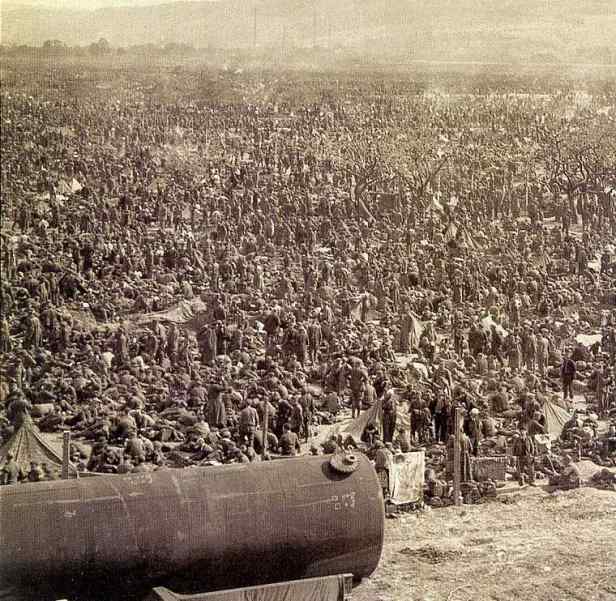 It should be no surprise that millions of Axis POWs were starved, murdered and enslaved. [url=http://after all millions of allied pows were afforded the same treatment at the hands of the allies./]Read here[/url]. After all millions of Allied POWs were afforded the same treatment at the hands of the Allies.
It should be no surprise that millions of Axis POWs were starved, murdered and enslaved. [url=http://after all millions of allied pows were afforded the same treatment at the hands of the allies./]Read here[/url]. After all millions of Allied POWs were afforded the same treatment at the hands of the Allies.Aleksandr Solzhenitsyn also complained of the shameful betrayal of Soviet soldiers by the Stalin and the Soviet Union. Solzhenitsyn wrote:
The first time she betrayed them was on the battlefield, through ineptitude…The second time they were heartlessly betrayed by the Motherland was when she abandoned them to die in captivity. And the third time they were unscrupulously betrayed was when, with motherly love, she coaxed them to return home, with such phrases as “The Motherland has forgiven you! The Motherland calls you!” and snared them the moment they reached the frontiers. It would appear that during the one thousand one hundred years of Russia’s existence as a state there have been, ah, how many foul and terrible deeds! But among them was there ever so multimillioned foul a deed as this: to betray one’s own soldiers and proclaim them traitors?[8]
I recommend Victims of Yalta to anyone interested in the history of World War II and its aftermath. The story is tragic and disturbing, but historically important and frequently unreported by historians.
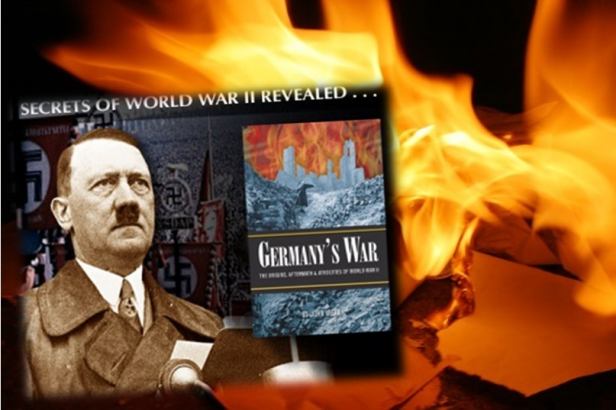 Unlike Hollywood history, Germany’s War acknowledges the calculated betrayal and slaughter of millions of Allied and Axis POWs with equal respect.
Unlike Hollywood history, Germany’s War acknowledges the calculated betrayal and slaughter of millions of Allied and Axis POWs with equal respect.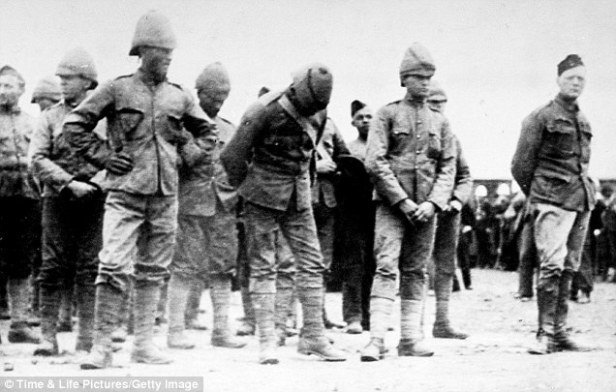 Read: The British Empire’s Holocaust Hypocrisy: The Shocking Reality Of The Second Anglo-Boer War Scorched Earth Policy. Churchill appears on the right. By the end of the war 72% of the Boer population were either dead or incarcerated in a prisoner of war camp or a concentration camp. Churchill was captured but never harmed. The Boer commandoes, unable to contain and provide for the Empire’s POWs in detention, would disarm and release them despite realizing they would always rejoin the war against them. “The Boers behaved like men, never shooting when they could take prisoners, and even apologized because they had to take our rifles and ammunition.”
Read: The British Empire’s Holocaust Hypocrisy: The Shocking Reality Of The Second Anglo-Boer War Scorched Earth Policy. Churchill appears on the right. By the end of the war 72% of the Boer population were either dead or incarcerated in a prisoner of war camp or a concentration camp. Churchill was captured but never harmed. The Boer commandoes, unable to contain and provide for the Empire’s POWs in detention, would disarm and release them despite realizing they would always rejoin the war against them. “The Boers behaved like men, never shooting when they could take prisoners, and even apologized because they had to take our rifles and ammunition.”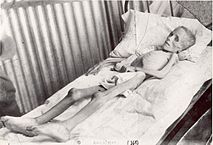 The Boer children suffered a holocaust, many were scorned, even mocked, as they died. God Bless little Lizzie. That Churchill knew of this suffering, was treated kindly and later, even wrote publicly about the the threat of Jewish-Bolshevism, yet went on to further its expansion across Europe points to the criminality of WWII.
The Boer children suffered a holocaust, many were scorned, even mocked, as they died. God Bless little Lizzie. That Churchill knew of this suffering, was treated kindly and later, even wrote publicly about the the threat of Jewish-Bolshevism, yet went on to further its expansion across Europe points to the criminality of WWII.ENDNOTES
[1] Tolstoy, Nikolai, Victims of Yalta: The Secret Betrayal of The Allies 1944-1947, New York and London: Pegasus Books, 1977, p. 355.
[2] Ibid.
[3] Ibid., p. 410.
[4] Ibid., pp. 33-35.
[5] Ibid., p. 34.
[6] Ibid., p. 55.
[7] Ibid., p. 41.
[8] Solzhenitsyn, Aleksandr I., The Gulag Archipelago, 1918-1956: An Experiment in Literary Investigation (Vol. 1) New York: Harper & Row, Publishers, 1974, p. 240.
 Subiecte similare
Subiecte similare» America's Jerusalem Embassy for Mass Murder, Occupation and Wider War
» Gen. Patton Exposes The Allied Conspiracy To Extend WW2 & Give Eastern Europeans To Stalin, Suddenly Patton Dies Burying The Real Holocaust
» Khazarian Mafia Purge Accelarates. Marines Storm CIA HQ To Stop Operation Mockingbird. Mass Indictments & Mass Arrests Underway.
» Another Allied Holocaust Ignored
» Gen. Patton Exposes The Allied Conspiracy To Extend WW2 & Give Eastern Europeans To Stalin, Suddenly Patton Dies Burying The Real Holocaust
» Khazarian Mafia Purge Accelarates. Marines Storm CIA HQ To Stop Operation Mockingbird. Mass Indictments & Mass Arrests Underway.
» Another Allied Holocaust Ignored
AMINTIRI DESPRE VIITOR-ROMÂNIA DE MÂINE , RrOMANIKA BABANA :: ISTORIA -prima si cea dintii carte a unei natii :: PROPAGANDA E MAI EFICIENTA DECIT DIVIZIILE DE BLINDATE(Vladimir Putin ) :: Undeva in Est , nebunia ca normalitate
Pagina 1 din 1
Permisiunile acestui forum:
Nu puteti raspunde la subiectele acestui forum